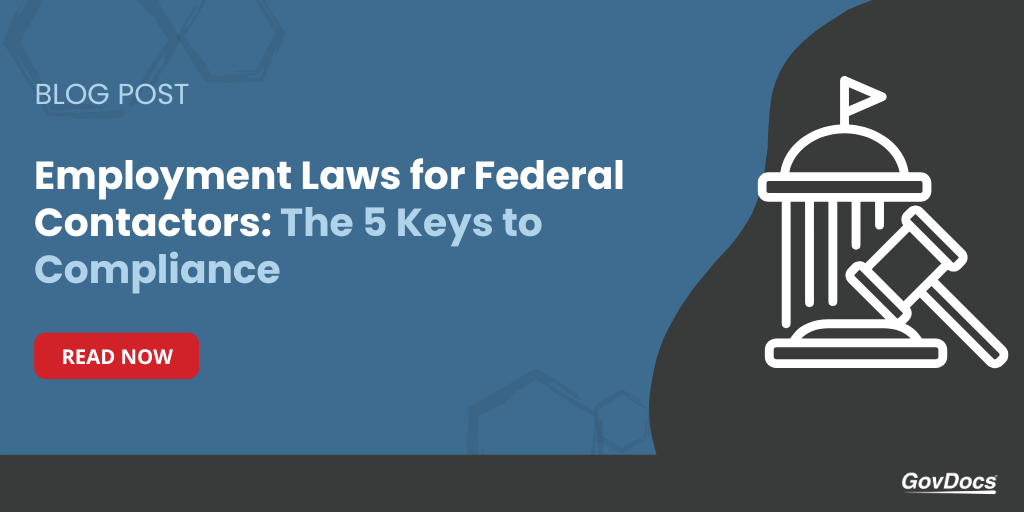EMPLOYMENT LAW NEWS
Employment Laws for Federal Contractors: The 5 Keys to Compliance
By GovDocs
Updated August 2024

Just like employers in certain industries, federal contractors have specific employment laws they must follow to maintain compliance.
Employment laws for federal contractors extend beyond the typical requirements of other types of employers.
From labor law postings to minimum wage and more, companies that have secured federal contracts should audit their employment law practices and procedures to ensure compliance.
Here are five employment laws federal contractors must be aware of to ensure they are in compliance.
1. Federal Contractor Minimum Wage
The current federal contractor minimum wage (as of Jan. 1, 2024) for work performed under contracts entered into, renewed, or extended on or after Jan. 30, 2022 is $17.20 per hour for non-tipped and tipped employees. This is subject to Executive Order 14026.
For work performed under federal contracts entered into, renewed, or extended prior to Jan. 30, 2022, the current federal contractor minimum wage (as of Jan. 1, 2024) is $12.90 per hour and the tipped worker wage is $9.05 per hour. This is subject to Executive Order 13658.
Federal contractors should also be aware that in October of 2023, a federal court in Texas enjoined enforcement of Executive Order 14026 in Texas, Louisiana, and Mississippi. The injunction applies to contracts and subcontracts in these states, regardless of where the work is performed. Note that this injunction does not apply to private federal contractors in these states.
Minimum Wage Management. Simplified.
2. Marijuana Laws
The changing landscape of legality at the state level for medicinal and recreational marijuana may leave federal contractors struggling with reconciling federal and state laws. The federal government still classifies marijuana as a Schedule I controlled dangerous drug, while the scope of protection for employees under the state’s laws varies. Off duty marijuana use in some states is protected in anti-discrimination laws. And although some of these laws have exemptions for federal contractors, not all of them include such exemptions.
Federal contractors also have a requirement to maintain and guarantee a workplace free from drugs. Failure to comply with this requirement may result in contract suspension or termination, loss of future contracts, and potential legal liabilities. As a result, federal contractors should carefully review their contracts, be informed of the state laws where they are working, and tread carefully.
Get More Out of Your Labor Law Poster Program
3. Federal Contractor Labor Law Postings
Employers with federal contracts in the U.S. are required to post a variety of specific labor law postings.
For example, all federal contractors are required to display the E-Verify poster. Several federal agencies have issued required postings for federal contractors. And some postings are only required to be displayed if a contract has a total value over $10,000, as well as other specific posting provisions.
View Updated Tip Sheet: E-Verify at a Glance
4. Nondiscrimination Efforts
Federal contractors also have specific obligations regarding nondiscrimination under Executive Order 11246.
The order bars most federal contractors from discriminating in employment decisions on the basis of:
- Race
- Color
- Religion
- Sex
- Sexual orientation
- Gender identity
- National origin
Meanwhile, the executive order also requires federal contractors to take affirmative action to ensure that equal opportunity is provided in all aspects of their employment.
Additionally, employers with federal contracts of at least $50,000 (and at least 50 employees) must also work to bolster the number of women and minorities in the workplace. That includes a formal action plan, recordkeeping and data collection.
Lastly, it prohibits federal contractors and subcontractors from, under certain circumstances, taking adverse actions against job applicants and employees for discussing their pay or the pay of their co‐workers.
Learn More About the Federal EEOC Labor Law Poster
5. Paid Sick Leave for Federal Contractors
Paid sick leave for federal contractors was initially installed as an executive order in 2015.
The next year, the U.S. Department of Labor (DOL) published a final rule to implement Executive Order 13706, establishing paid sick Leave for federal contractors.
The order requires organizations that have covered contracts with the federal government to provide covered employees with up to seven days of paid sick leave annually, including paid leave allowing for family care.
Check out the link above for:
- Categories of contracts and employees covered by the executive order
- Rules and restrictions regarding the accrual and use of paid sick leave
- Obligations of contracting agencies, the DOL and covered federal contractors
- Remedies and enforcement procedures
Paid Leave Management. Simplified.
Conclusion
Just like employers in certain industries, federal contractors have specific employment laws they must follow to maintain compliance.
The items listed above are just a few of the unique requirements for federal contractors, who should be sure to study other provisions that may apply, including:
- Obligations under the Service Contract Act
- Davis-Bacon Act requirements
- National Labor Relations Act obligations
Federal contractors should consult with legal counsel to ensure employment law compliance.
This Employment Law News blog is intended for market awareness only, it is not to be used for legal advice or counsel.
Keep Informed
with GovDocs Employment Law News
What is GovDocs?
GovDocs simplifies employment law compliance for large, multi-jurisdiction employers in the U.S. and Canada. The GovDocs software platform integrates three solutions in one convenient place to help you master the employment laws impacting your business. Whether you manage a postings, minimum wage or paid leave program, our products cut through research time, provide proactive insights into the everchanging landscape of employment laws and reduce the risk of noncompliance. The company is headquartered in Eagan, Minn.
The GovDocs Poster Store simplifies posting compliance for employers with less than 30 locations across all industries, offering a variety of posting products to meet your labor law compliance needs.




